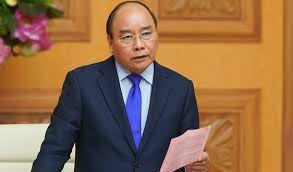Vietnam’s rice exports ready to flow again as Premier ends curbs
Vietnam will end rice export restrictions from the start of May, bringing closure to a month-long saga that sparked fears over food protectionism and caused global prices to spike.
Farmers in the Mekong delta, the country’s rice belt, have produced sufficient rice despite a drought, Prime Minister Nguyen Xuan Phuc said at a cabinet meeting Tuesday. Shipments will be allowed to return to normal, he said. “As well as food security, it’s necessary we ensure food exports are stable and guarantee the rights of rice farmers,” he added.

The world’s third-largest exporter interrupted the free-flow of exports in late March on fears for its own supplies, placing a quota on how much it could ship and causing thousands of rice containers to pile up at ports. That helped push up prices as concerns grew that Vietnam’s decision would prompt more nations to take protectionist measures.
The government faced mounting pressure to end the curbs, with exporters suffering financial losses as shipments were held up at ports. The move also brings relief for farmers as well as traders who shied away from signing new contracts.
“Our farmers are elated with the news,” said Tieu Ngoc Loi, director of Nhan Loi Cooperative in the Mekong Delta city of Can Tho. “It was hard seeing global prices surge, and being unable to offer our full stocks.”
Vietnam’s decision to halt rice shipments helped send benchmark Asian export prices to the highest since 2013, and triggered complaints from importers in the region, including Japan, Singapore, Philippines, Australia.
Vietnam suspended exports on March 24, before placing a 400,000 ton limit on shipments for April, almost half of what it exported in the same month last year. The government raised the quota by 100,000 tons after the food association said some 300,000 tons stuck at ports faced the risk of spoiling.
The country can ship 13.5 million tons of paddy this year, equal to 6.7 million tons of rice, out of forecast output of 43.5 million tons, the trade ministry said. Still, Vietnam does not rule out halting exports again if shipments are seen as a threat to national food security, according to the premier.
Vietnam’s rice exporters will have their export licenses withdrawn if they fail to maintain minimum levels of regular stockpiles equal to 5% of shipments over a six-month period. Also, the top 20 exporters are required to sign commitments with at least one local supermarket chain to ensure they can supply from their mandatory stockpiles when asked.
Similar Stories
December CNBC/NRF retail monitor results show strong growth boosted by final Thanksgiving weekend days
Retail sales jumped strongly in December, boosted in part by two busy holiday shopping days during Thanksgiving weekend falling in the final month of the year, according to the CNBC/NRF…
View ArticleNAW presents Dirk Van Dongen Lifetime Achievement Award to Bergman, CEO of Henry Schein, Inc.
At the 2025 NAW Executive Summit Gala on January 28 in Washington, D.C.
View Article
St. Louis region’s chemical industry welcomes new investment
View Article
Navigating compliance: Adapting to changing Customs regulations in global supply chains
View Article
December 2024 U.S. Transportation Sector Unemployment (4.3%) Was the Same As the December 2023 Level (4.3%) And Above the Pre-Pandemic December 2019 Level (2.8%)
View ArticleDP World appoints Jason Haith as Vice President of Freight Forwarding for U.S. and Mexico
DP World, a global leader in logistics and supply chain solutions, has announced the appointment of Jason Haith as Vice President, Commercial Freight Forwarding – U.S. and Mexico, effective immediately.…
View ArticleGet the most up-to-date trending news!
SubscribeIndustry updates and weekly newsletter direct to your inbox!





